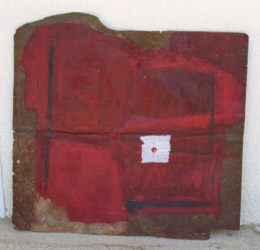

 AK: Thank you for your replies. My next 3 questions are perhaps more statements, or at best, rhetorical attempts at questions - I hope you will be able to respond.
AK: Thank you for your replies. My next 3 questions are perhaps more statements, or at best, rhetorical attempts at questions - I hope you will be able to respond.
I perceive you as a man, an artist, who has a great love for the written word - and for the book as an artifact of culture, a storehouse, a venerable tome of wisdom. Yet the work attacks this object, defaces it, renders it silent. To what extent is your art NOT censorship? NOT a kind of knee-jerk book burning of the most vicious sort?
TK: as much as books are a container of knowledge and perhaps the very essence of human evolution and civilisation - they are also proportionately very poisonous - the life they create in a man's mind is practically a very difficult one for in the world i live in there is very little space for the intelligence and inspiration that i have acquired from books the language becomes some kind of wagnerian sound for at times i feel i'm on the brink of insanity save that i can write and that enables me to have a dialogue with ma otherself- so for me it's not being destructive, itís merely a gesture of letting go of that which has guided me to this evolved state i'm in and when i write on them in ma mother tongue, i'm speaking back to them - contemplating the gifts the beauty and the dust and ashes that once was my innocent ignorance - i'm still on the passage way a very darksome one too, so ma art is ma light that keeps me from contemplating ma shadow.
AK: In choosing to situate your visual and sculptural concerns on the autonomous body of the book-as-object you clearly foreground THE BOOK in terms of how it operates as a cultural replicator, and also controller. Would it not be more germane to your struggle as a man, as an artist, as a so-called "black" to write your own books and leave those already published well alone? Is your destruction art not a pathologically unfulfilled author's subconscious desire, returning like the repressed, to render havoc on the world, and particularly to the world of the word?
TK: when i began to write i really wanted to get published and i had never had illusions that it will take a long time and there was a lot to be learned - on realising the amount of information circulating in the world, a question came over me, a question that is still haunting me - what do you have to say to the world that hasn't been said, for a while this kept me under a heavy weather, but what has remained clear on my mind all ma days is that when i'm forty i will be on the tower of knowledge that will enable me to utter words worth the ear of the world.
AK: You mentioned to me a week after the show that you had had a lot of criticism from certain elements about your use of the colour red. Could you perhaps extrapolate on that?
TK: the colour red is the colour of memory and transition a colour of loss as well as a colour of life for me it's an element that energises ma innate being as well as a reminder that i'm so fragile therefore i'm crimson red inside.






















